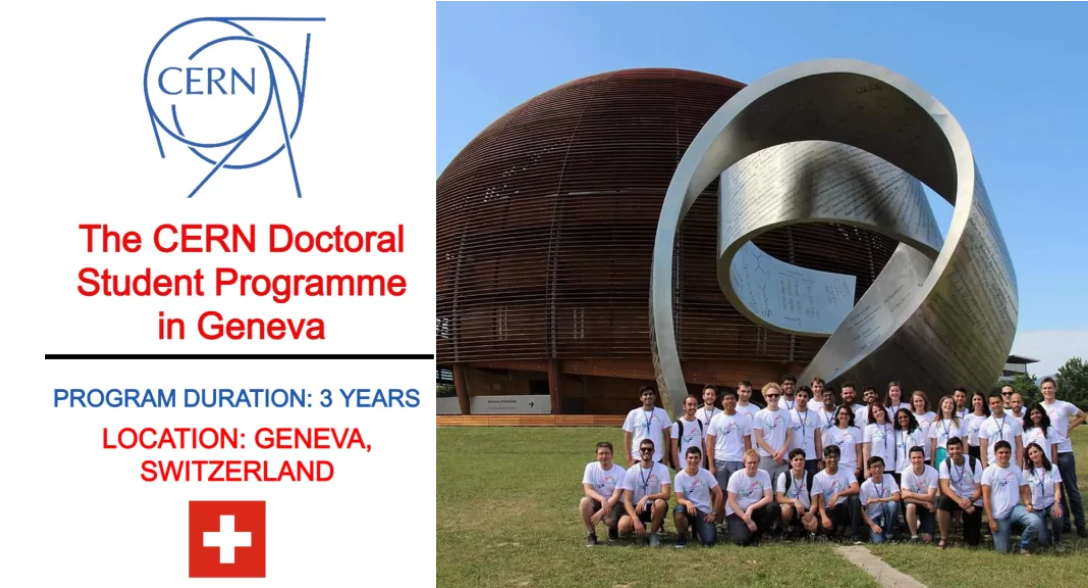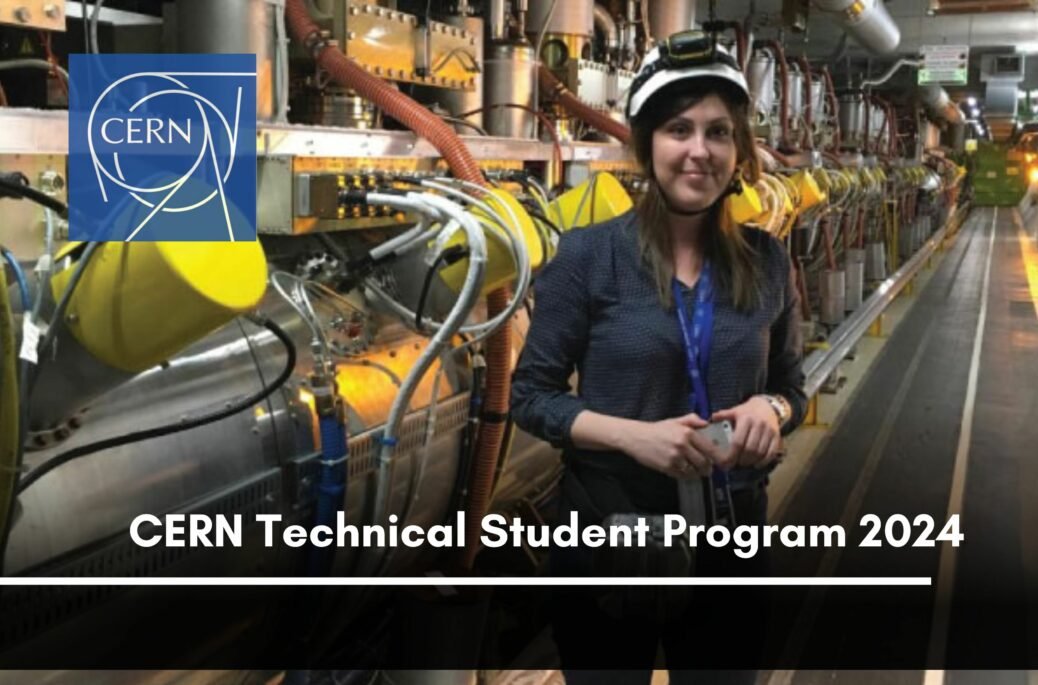Are you pursuing a doctorate and have a keen interest in physics, engineering, or computing?
Look no further than the CERN Doctoral Student Program 2025! At the largest scientific center in the world, this fully financed international program provides a rare chance to participate to ground-breaking studies and game-changing discoveries. Working with world-class experts, gaining practical experience, and developing your knowledge of science are all benefits of being a PhD student at CERN.
Participating in the CERN Doctoral Student Program 2025 will allow you to join a strong worldwide research community that is advancing science. You will be able to collaborate on your thesis with some of the world’s most creative minds thanks to access to state-of-the-art research facilities and resources. An association contract that lasts up to 36 months will provide you plenty of opportunity to contribute meaningfully and obtain priceless knowledge about the status of science.
Don’t pass up this chance to further your scientific career and help CERN conduct innovative research. The CERN Doctoral Student Program 2025 covers medical insurance, a sizable monthly stipend, financial support, and international travel expenses. To begin the process of joining the most esteemed international center for particle physics research, submit your application right now. You’ll join a forward-thinking group at CERN that is shaping scientific discovery going forward.
Read Also: LPI Summer Internship 2025 in the USA (Fully Funded)
About CERN and the Doctoral Program

Leading the way work in particle physics, engineering, and other STEM domains is internationally acknowledged at CERN. Scientists study the fundamental particles and forces that make up the universe at the Large Hadron Collider (LHC), the largest particle accelerator in the world, which is located close to Geneva, Switzerland. Through the CERN Doctoral Student Program, advanced resources, infrastructure, and knowledge at CERN are made available to doctorate candidates, who can also contribute to and participate in major research projects.
The devices are detectors and particle accelerators designed specifically for CERN. Accelerators accelerate particle beams to high energies, which cause them to collide with each other or with stationary targets. These mishaps are observed by detectors, which record the results. The CERN laboratory was established in 1954 and is located close to Geneva on the Franco-Swiss border. With 23 member states now, it was one of the first cooperative endeavors in Europe.
Young researchers in fields like particle physics, engineering, IT, applied physics, and more are urged to join in the program, which aims to stimulate creativity and teamwork. In order to make substantial scientific contributions, participants work with prominent scientists and engineers at universities and research institutes around Europe.
Read Also: LPI Summer Internship 2025 in the USA (Fully Funded)
What does “CERN” stand for?
At an intergovernmental UNESCO meeting in Paris in December 1951, a decision was made to establish the first European Council for Nuclear Research, or Conseil Européen pour la Recherche Nucléaire. A deal to establish the Council in the meantime, which came to be known as CERN, was reached after two months. Particle physics is the main area of research at CERN, and scientists now understand a great deal more about matter than just its nucleus. This is the rationale behind the frequent referring to the CERN laboratory as the European Laboratory for Particle Physics.
Our research at CERN advances our understanding of the universe’s composition and functioning.
In order to push the limits of human knowledge, we accomplish this by offering researchers a particular array of particle accelerator facilities. Since its foundation in 1954, the Laboratory has emerged as a major example of global cooperation.
Our Mission is to:
- Conduct cutting-edge fundamental physics research.
- Offer a distinctive array of particle accelerator facilities that, in an eco-friendly and sustainable manner, permit cutting-edge research.
- Unite people from around the globe to progress science and technology for the benefit of all.
- Instruct future generations of engineers, technologists, and physicists; additionally, include all citizens in scientific values and research.
Our Goals
- Discovery through science
- Technological innovation
- Diversity and bringing nations together
- Inspiration and Education
We want to:
- Produce top-notch scientific findings and understanding;
- Take use of the high-luminosity phase of the LHC, our top accelerator;
- A large community by offering, maintaining, and consistently updating a varied, complementary scientific agenda;
- Get ready for a high-energy accelerator project after the LHC.
Beyond science, we also aim to:
- Act as a politically unbiased spokesperson for science, promoting funding for basic science and evidence-based policy;
- Create more connections with business to facilitate the transfer of information from CERN to business; educate a new generation of engineers and scientists;
- Encourage and cultivate a scientific mindset among all citizens.
Read Also: Cost of Living in the USA for International Students
Advantages of the Swiss CERN Doctoral Student Program 2025:

- An opportunity to work at the forefront of technological innovation in a variety of sectors.
- A monthly stipend of 3868 Swiss Francs will be provided to you as part of this PhD research opportunity.
- To help with the expense of transportation to and from CERN, a travel allowance will be given.
- Furthermore, you will receive complete health insurance coverage to guarantee your wellbeing during the CERN program.
- In addition, you will receive two to five days of paid leave every month, which will enable you to rest and recover as needed.
- After being chosen, you will be given an association contract that is initially good for six months and can be renewed for up to three years, requiring a long-term commitment.
- Should you be married and have kids, you might be eligible for extra assistance.
- There will be health insurance available.
- Decision to complete the course of study in four years, including time spent in college
- Discover the culture of Switzerland.
- Obtain expertise in writing a PhD thesis abroad
CERN Doctoral Student Program 2025 Eligibility Requirements:
- Applicants are only eligible for the program if they are citizens of a CERN member state.
- Candidates must be enrolled in a PhD program at a university or in the process of enrolling.
- The suggested thesis project should support the candidate’s PhD requirements and have a clear connection to CERN.
- After a candidate completes the program successfully, their own university must grant them a PhD.
- Given that French and English are the two main languages used at CERN for communication, proficiency in both languages is encouraged.
Required Documents:
- A valid passport
- Curriculum Vitae (CV)/Resume
- Academic Transcript
- Experience Letter (if applicable)
- English Language Certificate
- Reference letter from an accredited Professor
- Reference letter from any previous internship (if applicable)
Deadline: The CERN Doctoral Student Program 2025 in Switzerland will accept applications until November 4, 2024, at 23:59 CET.
Read Also: Bangor University – Ranking, Fees, Scholarships Courses
How can I apply to the Swiss Doctoral Student Program at CERN in 2025?
- To access the application page, go to the official CERN Doctoral Student Program website or search online.
- To express your interest in the program, select the “I’m interested” or any comparable option.
- Fill up the online application form with your personal details, educational history, and any other information that is required.
- Upload any relevant files, such as your résumé or curriculum vitae, academic transcript, experience letter (if applicable), English language proficiency certificate (if needed), and letters of recommendation from recognized instructors and prior internships.
- If the application contains any essay-based questions, thoroughly answer them.
- Make sure all of the information you submitted is correct and comprehensive by carefully reviewing your application.
- Once you’re satisfied, submit your application by the deadline.
Duration and Program Structure
The duration of the CERN Doctoral Student Program is flexible and extends from six to thirty-six months, depending on the student’s needs regarding research and academic requirements. Throughout this time, participants engage in organized research activities, work on projects that are vital to CERN’s larger research goals, and gain mentoring from CERN experts.
One of the program’s key goals is to collaborate with universities. Students work with their home university to complete their PhD studies, integrating their academic work with state-of-the-art experimental facilities at CERN. Through this relationship, students will have the opportunity to make a meaningful contribution to both their own academic work and the scientific purpose of CERN.
Read Also: University of Warwick Chancellor’s International Scholarships 2025 Study in UK
Life as a CERN Doctoral Student

A CERN doctoral student’s life is a singular and life-changing opportunity to fully immerse oneself in cutting-edge research at one of the most prestigious scientific institutes on the planet. Doctorate students participate in a variety of research projects as active members of CERN’s community, obtaining practical experience in cutting-edge disciplines like particle physics, engineering, and computer science.
1. How long is the CERN Doctoral Student Program, and is it renewable?
The CERN Doctoral Student Program normally lasts between 6 and 36 months, depending on the candidate’s research needs and agreement with their home school. Extensions are available if the student’s academic performance and research progress justify an extended stay. However, these choices are decided on a case-by-case basis and require clearance from CERN and the candidate’s university.
2. What monetary advantages does the CERN Doctoral Student Program offer?
The program is completely supported, providing a monthly stipend that covers living expenses in Geneva, which is one of the more costly cities in Europe. Apart from the grant, the program provides health insurance and a travel stipend to help students get to and from CERN. The actual stipend amount depends on the student’s circumstances and is aimed to guarantee they can focus totally on their study without financial concerns.
3. Can non-EU students apply for the CERN Doctoral Student Program?
Absolutely the program is open to students from CERN member nations, associate member states, and certain additional countries. While CERN has a strong European concentration, it also welcomes applicants from many places across the world. Students should validate their eligibility based on their native country by visiting CERN’s official eligibility page.
4. Does the program require me to speak French or English fluently in order to participate?
While CERN is a multilingual workplace, the major working language is English. Fluency in English is necessary, as it is the language used for most scientific communication and research activities. French is not necessary, yet knowledge of French can be advantageous for daily living in Geneva. However, language proficiency should not stop competent people from applying.
5. How competitive is the CERN Doctoral Student Program, and what factors improve the chances of acceptance?
The program is highly competitive, with a demanding selection process. Candidates are examined based on their academic achievements, research potential, and fit with CERN’s research aims. To improve your prospects, it’s crucial to submit a quality application with a clear research plan, credible letters of recommendation, and a CV that highlights relevant academic and research experience. Demonstrating how your work will contribute to CERN’s mission will considerably boost your proposal.
Read Also: What’s the Difference Between MBA and MSc
In Conclusion, the CERN doctoral Student Program 2025 gives an unprecedented opportunity for doctorate students to participate in cutting-edge research at one of the world’s most recognized scientific institutions. With its fully supported structure and access to modern resources, the program offers major academic, professional, and personal benefits for students in subjects such as physics, engineering, and computer science. If you are passionate about research and want to contribute to the future of science, don’t miss out on this fantastic chance. Visit CERN’s official website and start your application immediately!
